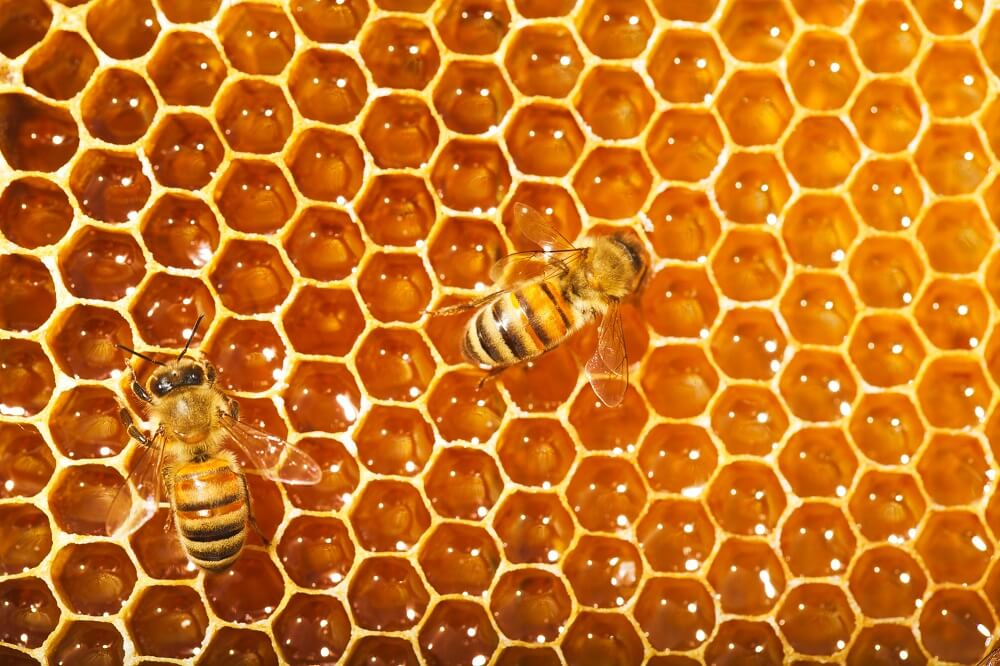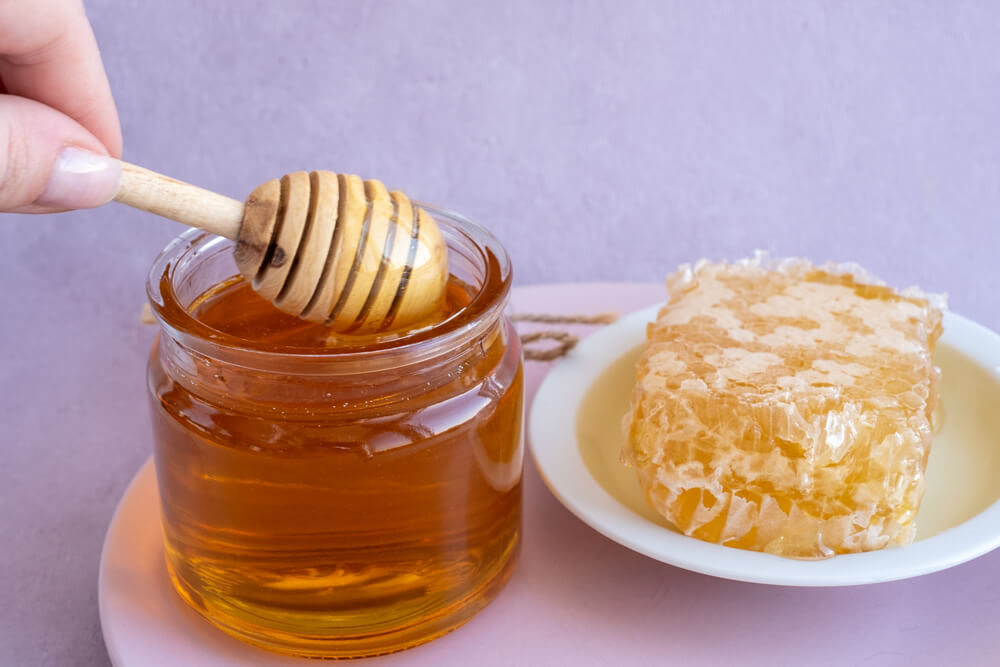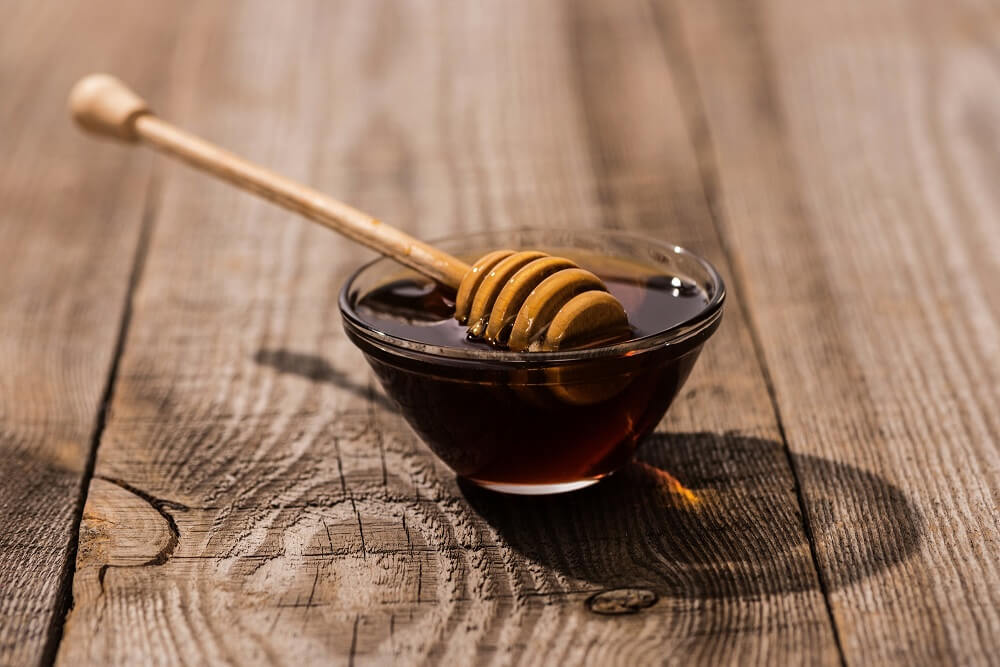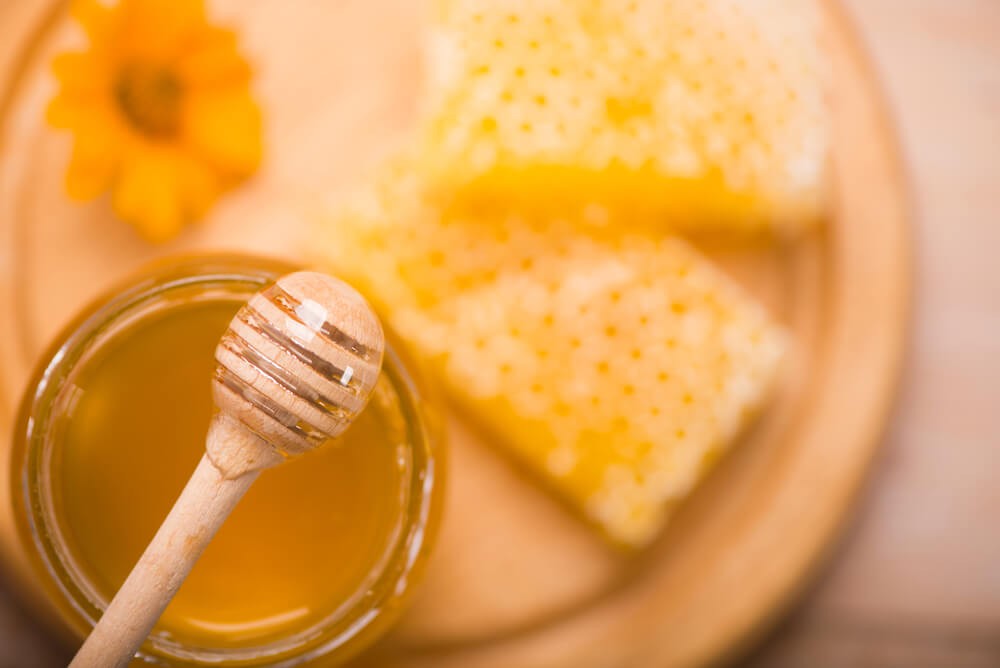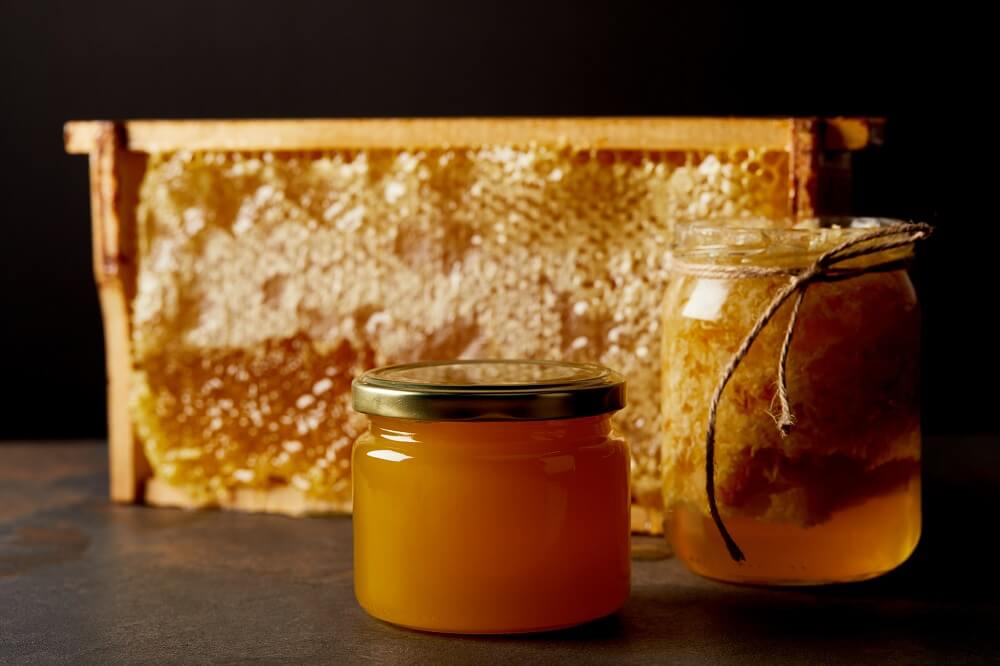What is Acacia Honey?

Acacia honey, also known as locust honey, is produced by honeybees that feed on black locust flowers.
The black locust tree is native to North America and Europe. The flowers are a creamy white with faint yellow centers. Black locust trees grow fast and reach 82 feet tall at maturity.(1)
And the best part?
Black locust blossoms smell heavenly.
Their delicious scent attracts honeybees by the thousands. Their blooms have a sweet, floral aroma with light citrus undertones.
But now comes the big question:
What does acacia honey taste like?
Raw acacia honey has a medium sweetness with hints of vanilla. The taste is delicate and smooth, with almost no aftertaste. Acacia honey is highly sought after because it has a mild flavor that isn’t overpowering.
It’s the perfect biscuit honey.
And even better?
Acacia honey crystallizes much slower than other honey varieties. Crystallization happens as honey gradually changes from liquid form to solid form. Acacia honey has high fructose content, so the honey stays liquid for much longer.(2)

But there’s something you should know.
Acacia honey has numerous health benefits thanks to its antibacterial, anti-inflammatory, and antifungal properties. That said, these benefits only come from raw honey.(3)
Raw acacia honey is honey straight from the beehive. It’s packaged without any heating or processing.
Why does this matter?
Because some companies process honey to the point where it’s no longer considered pure honey.
Honey gets stripped of its beneficial antioxidants and enzymes when overheated during the pasteurization process. This can decrease the acacia honey’s ability to treat sore throats, coughs, and skin wounds.(4, 5)
And here’s the kicker:
Processed honey often includes artificial sweeteners such as high fructose corn syrup or aspartame. Because of this, overly processed honey is no longer considered genuine honey, according to the FDA.(6)
So how is raw honey different?
Raw acacia honey hasn’t been heated, filtered, or mixed with other ingredients. As such, it maintains all the healthy enzymes, antioxidants, and nutrients that make honey a superfood.
So as a general guideline, always check for honey labels that say “raw honey” on them. It’s much better than the low-budget honey in plastic bear containers.
What Are the Benefits of Acacia Honey?

Raw honey has been used for centuries as a natural sweetener and medicinal product.
In fact, honey usage dates back over 3,000-years-ago, when ancient Egyptians used it as an offering to their gods and goddesses.
Acacia Honey Nutrition
One tablespoon of this honey contains:
- Calories: 60 calories
- Protein: 0 grams
- Fat: 0 grams
- Carbs: 17 grams
- Sugars: 16 grams
So what are the acacia honey benefits? Let’s discuss a few.
Benefit 1: Honey is Rich in Antioxidants

Raw honey has flavonoids and phenolic acids, which are antioxidants that protect our bodies against cell damage. Cell damage can lead to conditions like premature aging, type 2 diabetes, and heart disease.(7, 8)
Flavonoids are the primary antioxidants in acacia honey. A diet high in flavonoids can decrease your risk of chronic illnesses, such as heart disease and some types of cancer.(9, 10)
The antioxidant compounds found in raw honey have anti-inflammatory effects that could help prevent several conditions associated with oxidative stress.(11)
In test-tube research, acacia honey has been shown to stop the spread of lung cancer cells effectively.(12)
In several studies, raw honey has been shown to benefit the respiratory, gastrointestinal, cardiovascular, and nervous systems.(13)
Benefit 2: Honey is Antibacterial

Honey has been shown in several studies to help heal burns and infections that develop after surgery.(14)
The antibacterial properties of raw acacia honey are likely responsible for many of its healing properties.
The honey includes chemicals that produce and gradually release hydrogen peroxide. Hydrogen peroxide is an acid that destroys bacteria by breaking down their cell walls.(15, 16)
Acacia honey is effective against Staphylococcus aureus and Pseudomonas aeruginosa, both of which are antibiotic-resistant bacteria. The study concluded that the honey’s high levels of hydrogen peroxide caused it to be effective against these bacteria.(17)
Benefit 3: Honey May Improve Heart Health

In some studies, raw honey has been linked to a decreased risk of heart disease.
In one study of 4,500 individuals, honey consumption was linked to a decreased risk of high blood pressure.(18)
Honey has been shown to have a beneficial effect on blood fat levels, heart function, and blood pressure, according to one study. (19)
In a rat study, honey was found to protect the heart against oxidative stress.(20)
Propolis, a resin produced by honeybees from sap-producing trees, is also found in raw honey. This chemical has cholesterol-lowering and triglyceride-lowering effects.(21)
Benefit 4: Honey Can Soothe Sore Throats and Coughs

Coughing is an all-too-common problem among children with upper respiratory symptoms, and it can have a detrimental impact on both children’s sleep as well as their parents’ sleep.
Fortunately, raw honey may be an excellent alternative to traditional cough medications, according to studies.(22)
According to one study, honey appears to be more effective than diphenhydramine (a cough medicine ingredient) in suppressing cough symptoms.(23)
Honey may also help reduce the length of cough duration.
Honey has been found in several studies to be beneficial for treating upper respiratory illnesses.(24)
In one study, honey was revealed to help children and parents sleep better while suffering from coughs.(25)
Unlike some cough medicines, honey doesn’t have any side effects.
That said, honey should never be given to babies under 12 months old because of the threat of infant botulism.(26)
What Are the Risks of Acacia Honey?
Acacia honey is considered safe for most adults.
That said, you should be aware of the following risks:
Risk 1: Honey Can be Harmful to Babies under 12 Months Old

Honey is not recommended for babies because of the threat of infant botulism.
Botulism is a rare foodborne illness caused by the bacteria Clostridium botulinum. Botulism can affect the nervous system and lead to respiratory failure and paralysis.
Honey is a common cause of botulism in infants under 12 months old. They don’t yet have the immunological ability to combat the bacteria.
Risk 2: Honey Can Raise Blood Sugar Levels in Diabetics

If you have diabetes, acacia honey can raise your blood sugar levels.
So while acacia honey has health benefits, it’s essential to be aware that it still contains sugar and carbohydrates. People with diabetes must carefully regulate their carbohydrates throughout the day, especially while taking insulin.
And since honey and sugar will raise your blood sugar level, they should be eaten in moderation.
FAQs on Acacia Honey
- Does acacia honey crystallize?
- What is acacia honey good for?
- What is the taste of acacia honey?
- Is acacia honey pure honey?
- Does acacia honey come from bees?
- Can you buy acacia honey with honeycomb?
- Is acacia honey in tea good?
- Is acacia honey vegan?
- Can acacia honey be used for weight loss?
- What color is acacia honey?
- How do you take acacia honey?
- Is acacia honey safe?
- Is acacia honey beneficial to the skin?
- Where can I buy acacia honey?
Does acacia honey crystallize?
All honey crystallizes eventually. This includes acacia honey, wildflower honey, and any other type of raw honey you can think of.
That said, acacia honey crystallizes slower than other types of honey. This is because it has higher amounts of fructose sugars.
But remember:
Crystallization is a normal process. It doesn’t mean your honey has expired. Instead, it means the liquid honey had transitioned into a solid form.
Crystallization happens because honey is full of natural sugars. Due to honey’s low moisture content, there is little water available to keep the sugars dissolved.
Over time, the sugar and water in honey begin to separate, forming tiny crystals.
—> Go back to the FAQs on acacia honey
More to Explore:
What is acacia honey good for?
People often ask, “Is acacia honey the best?”
Acacia honey is good for both its taste and health benefits. It’s hard to say if it’s the best type of honey because that depends on your preferences.
Plus, there are more than 300 varieties of honey. Different flavors include clover, wildflower, and buckwheat honey.
With that in mind, raw acacia honey is good for soothing sore throats and coughs. It’s also shown promising results for treating wounds like burns and cuts. Raw honey may also have heart health benefits, such as lowering blood pressure and regulating the heartbeat.
As for the taste of acacia honey, it’s a delicate taste that works great on its own or with other foods. Acacia honey is easy to use as a natural sweetener because it has a slower crystallization rate. If you have a sweet tooth, you’ll enjoy this honey variety.
—> Go back to the FAQs on acacia honey
More to Explore:
- The Brutally Honest Truth About Sour Honey
- Buckwheat Honey: Uses, Benefits, & Risks
- Can You Eat Honeycombs?
What is the taste of acacia honey?
Acacia honey’s taste is sweet with a slightly floral flavor. It’s lighter in taste than other types of honey, such as manuka honey.
For example, manuka honey has an earthy undertone with a slightly bitter aftertaste. The taste of manuka honey isn’t very sweet. In contrast, acacia honey is sweeter with subtle hints of floral. It has almost no aftertaste.
Acacia honey is delicious honey that goes well with herbal tea. It’s also the perfect gift for someone suffering from a sore throat because it has natural antibacterial properties.
—> Go back to the FAQs on acacia honey
More to Explore:
Is acacia honey pure honey?
Raw acacia honey is pure honey straight from the beehive. When purchasing honey, make sure the label says the honey is “raw honey.” This is how you know the honey is pure honey with no added sweeteners.
People also ask, “What’s the difference between acacia honey vs. normal honey?
This is a tricky question to answer because there is no such thing as “normal honey.” There are over 300 types of honey, including clover honey, manuka honey, and blueberry honey.
—> Go back to the FAQs on acacia honey
More to Explore:
- The Top 3 Best Manuka Honey Brands
- Orange Blossom Honey: Uses, Benefits, & Risks
- Sourwood Honey: Uses, Benefits, & Risks
Does acacia honey come from bees?
People regularly ask, “Where does acacia honey come from?”
Acacia honey, also called locust honey, is produced by honeybees that collect nectar from black locust trees (Robinia pseudoacacia). The flower-like aroma attracts the honeybees to the blooms. It has a pale color and light taste with flowery notes.
Many people believe that this honey comes from real acacia trees. It does not. Instead, it comes from black locust trees native to North America and Europe. This tree’s blossoms attract honeybees by the thousands.
—> Go back to the FAQs on acacia honey
More to Explore:
Can you buy acacia honey with honeycomb?
Yes, acacia honey with honeycomb is available for purchase. The acacia honeycomb is edible and often used to decorate cheese boards or charcuterie spreads. The mild taste pairs nicely with other foods.
Honeycomb is made of beeswax and is edible. Honeycomb can be chewed up and swallowed or spit out.
—> Go back to the FAQs on acacia honey
More to Explore:
- Eucalyptus Honey: The Taste, Health Benefits, & Risks
- What Are Honeycombs Make Of?
- Cinnamon Honey: Are There Health Benefits?
Is acacia honey in tea good?
Acacia honey in tea is a great way to sweeten your tea without sugar. Acacia honey has a lighter taste than other types of honey, so it won’t overpower the taste of your tea.
To add acacia honey to tea, simply add a spoonful of honey to your cup of tea while it’s hot. You don’t have to wait a long time for the honey to combine into the tea, simply give it a good stir.
—> Go back to the FAQs on acacia honey
More to Explore:
Is acacia honey vegan?
No, honey isn’t considered vegan because bees make it. While bees aren’t animals, they’re still living creatures that most vegans don’t want to harvest from.
—> Go back to the FAQs on acacia honey
More to Explore:
- Honey For Allergies: Is it a Potential Cure?
- Fermented Garlic and Honey Recipe
- What’s the Difference Between Raw and Organic Honey?
Can acacia honey be used for weight loss?
Honey is full of sugars and calories, so it’s not going to help you lose weight. It’s best to limit your honey and sugar consumption if you’re trying to lose weight.
Instead, organic honey can be used for medicinal purposes such as treating wounds and soothing upper respiratory infections. This is because it’s anti-inflammatory and antibacterial, with small amounts of nutrients like vitamin c.
—> Go back to the FAQs on acacia honey
More to Explore:
What color is acacia honey?
Acacia honey has a light color with a yellow or amber hue. Sometimes it can appear almost transparent. The color can vary between bottles, depending on which locust trees the honey bees pollinate.
Black locust trees are members of the fabaceae family. They’re drought tolerant and perform well in poor soils.
—> Go back to the FAQs on acacia honey
More to Explore:
How do you take acacia honey?
Acacia honey can be taken directly from a spoon or added to food and drinks. It has an excellent sweet flavor that works well in tea, coffee, and smoothies. It’s also good for adding to oatmeal, yogurt, ice cream, or cereal. The delicate flavor pairs nicely with many things.
—> Go back to the FAQs on acacia honey
More to Explore:
Is acacia honey safe?
Yes, acacia honey is considered safe for most adults.
The exception is for children under the age of 12 months old. Children under 12 months old shouldn’t consume any honey because of the risk of botulism.
People with diabetes should also consume honey in moderation because it can raise blood sugar levels. Honey doesn’t have a low glycemic index since the GI score is 58.
Also, allergy sufferers may need to consult their doctor before consuming honey.
—> Go back to the FAQs on acacia honey
More to Explore:
Is acacia honey beneficial to the skin?
Yes, natural acacia honey is beneficial to the skin. Acacia honey has antioxidant and anti-inflammatory properties that can help heal wounds. Raw honey has been studied in several clinical trials to heal wounds like diabetic foot ulcers. Antioxidants can also help keep free radicals in check.
Honey has antimicrobial properties, which means it can help fight infection. Raw acacia honey can be used topically on the skin.
—> Go back to the FAQs on acacia honey
More to Explore:
- Honey for Skin Benefits: Directions, Uses, & Risks
- 8 Scientific Benefits of Raw Honey
- Allergic to Honey: Signs of a Honey Allergy + Treatment
Where can I buy acacia honey?
The best place to buy American acacia honey is from a local beekeeper. If you don’t have a beekeeper in your area, you can purchase raw acacia honey online.
Just make sure the honey label says it’s “raw honey.”
Avoid overly processed honey because it often gets stripped of its nutritional benefits during the pasteurization process.
